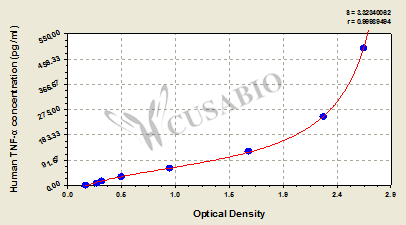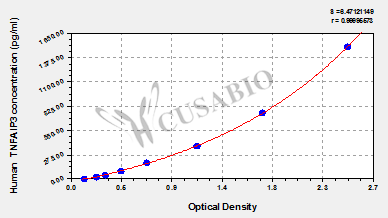Tumor Necrosis Factor ELISA Kits
Tumor necrosis factor (TNF) is a cytokine that is widely involved in biological processes such as inflammation, immunity and apoptosis. TNF was originally found to have an effect of killing tumor cells, hence the name.
Classification and biological functions of tumor necrosis factor
Currently, two types of TNF are known, namely TNF-α and TNF-β, also known as lymphotoxin-α and lymphotoxin-β. They all have a wide range of biological functions, including immune regulation, inflammatory response, apoptosis, tumor growth and development, etc.
TNF-α is mainly produced by immune cells such as macrophages, T cells and B cells, and is one of the most important cytokines in the inflammatory response. It can cause inflammation reactions such as redness and swelling of local tissues and thermal pain. In addition, TNF-α can also promote angiogenesis, increase vascular permeability, and induce apoptosis. In tumors, TNF-α can exert anti-tumor effects by activating immune cells and inducing tumor cell apoptosis.
TNF-β is mainly produced by T cells and B cells. Similar to TNF-α, it also has biological functions such as regulating the immune system, promoting inflammatory response and anti-tumor. Unlike TNF-α, TNF-β has a weak role in inducing apoptosis and promoting angiogenesis.
Role of tumor necrosis factor in immune regulation
The signaling pathway of TNF is mainly transmitted through two receptors, namely TNFR1 and TNFR2.
Activation of TNFR1 initiates a variety of signaling pathways, including:
- NF-κB signaling pathway: After TNFR1 activation, the death domain inside TNFR1 can bind to the adaptor protein TRADD, thus activating IKK(IκB kinase) and leading to degradation of IκB and activation of NF-κ B.
- MAPK signaling pathway: TNFR1 activation can regulate cell growth, differentiation and apoptosis by activating various MAPK (mitochondrial related signaling pathways, JNK, ERK).
- Caspase signaling pathway: When TNFR1 is activated, it will activate the Caspase protein through a complex signal transduction pathway, leading to apoptosis.
- PI3K/Akt signaling pathway: The activation of TNFR1 can also activate phosphatidylinositol 3- kinase (PI3K) and Akt signaling pathways that promote cell survival.
Activation of TNFR2 is mainly mediated by the NF-κB signaling pathway, but its signaling pathway may also intersect with that of TNFR1. Since most of the information about TNF signaling comes from TNFR1, the role of TNFR2 may be underestimated.
Research prospect of tumor necrosis factor
TNF has become one of the hot research areas in tumor treatment. Clinical trials have shown that TNF can directly induce apoptosis of tumor cells, or remove tumor cells by activating the immune system. In addition, TNF can also inhibit tumor growth and proliferation by regulating the tumor microenvironment.
In the field of autoimmune diseases, TNF has a significant curative effect in the treatment of diseases such as rheumatoid arthritis, inflammatory bowel disease and psoriasis. In the field of infectious diseases, TNF, as an important immune regulatory factor, plays an important role in the occurrence and development of infections such as bacteria, viruses and fungi.
In conclusion, tumor necrosis factor is an important research field, and its mechanism of action, drug development and clinical application will be further explored in future research to provide a more effective method for the treatment and prevention of diseases.
Tumor necrosis factor related ELISA kits
As a type of cytokine with important biological functions and pharmaceutical research value, tumor necrosis factor ELISA kit products provided by CUSABIO covers almost all TNF types, and all products have high sensitivity, high precision and high stability. Below are some display images of tumor necrosis factor ELISA kits provided by CUSABIO.
| Code |
Product Name |
Sensitivity |
Detection Range |
| CSB-E16713h |
Human Complement C1q tumor necrosis factor-related protein 1(C1QTNF1/CTRP1) ELISA Kit |
0.078 ng/mL |
0.312 ng/mL-20 ng/mL |
| CSB-EL003647HU |
Human Complement C1q tumor necrosis factor-related protein 2(C1QTNF2) ELISA kit |
0.039 ng/mL |
0.156 ng/mL-10 ng/mL |
| CSB-EL003648MO |
Mouse Complement C1q tumor necrosis factor-related protein 3(C1QTNF3) ELISA kit |
0.78 ng/mL |
3.12 ng/mL-200 ng/mL |
| CSB-EL003651HU |
Human Complement C1q tumor necrosis factor-related protein 6(C1QTNF6) ELISA kit |
0.078 ng/mL |
0.312 ng/mL-20 ng/mL |
| CSB-EL003654HU |
Human Complement C1q tumor necrosis factor-related protein 9A(C1QTNF9) ELISA kit |
0.078 ng/mL |
0.312 ng/mL-20 ng/mL |
| CSB-E04743h |
Human Tumor necrosis factor β,TNF-β ELISA KIT |
3.9 pg/mL |
15.6 pg/mL-1000 pg/mL |
| CSB-E04744m |
Mouse Tumor necrosis factor β,TNF-β ELISA KIT |
4.7 pg/mL |
18.75 pg/mL-1200 pg/mL |
| CSB-E16980p |
Pig Tumor necrosis factor (TNF/TNFA/TNFSF2) ELISA kit |
0.040 ng/mL |
0.047 ng/mL-3 ng/mL |
| CSB-E04741m(1) |
Mouse Tumor necrosis factor α,TNF-α ELISA KIT |
15.6 pg/mL |
62.5 pg/mL-4000 pg/mL |
| CSB-E11737c |
Dog Tumor necrosis factor α,TNF-α ELISA Kit |
0.039 ng/mL |
0.156 ng/mL-10 ng/mL |



